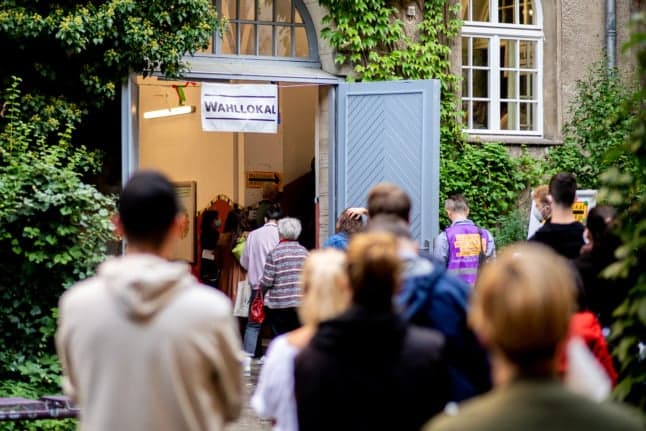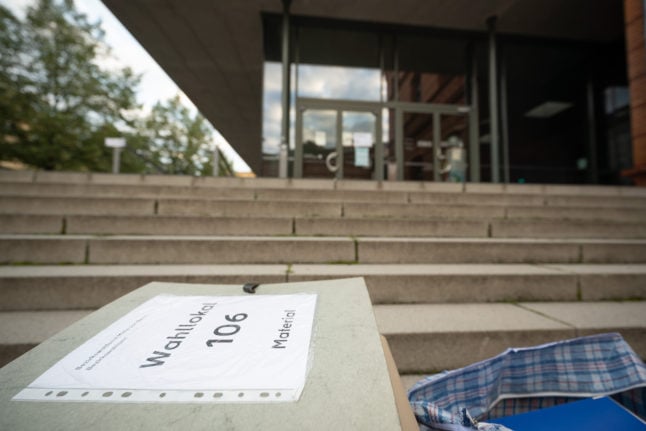EXPLAINED: Why Berlin could vote again after 2021 election disaster

Long lines, ballot shortages, and logistical snafus mean the capital will probably have to repeat the 2021 election. Now the federal 'traffic light' coalition is weighing in. We explain a few possible scenarios.
If there’s one place in Germany where the myth of German efficiency goes to die, it is Berlin.
Whether it’s the BER airport - eight years delayed and frequently plagued by security staff shortages and long lines - or whether it’s the two-month wait to get a Bürgeramt appointment to register your apartment or get your driver’s license, the capital is infamous for its bureaucratic dysfunctionality.
Now we can add the 2021 election to the list.
Run the same day as the world-famous Berlin Marathon, many inner-city polling stations along the Berlin route ran out of ballot papers because delivery trucks couldn’t get them there fast enough.
The lines grew, some people left them, and many voting stations stayed open after the 18:00 deadline, leading the city’s constitutional court to declare last week that the snafus likely affected the final result - meaning Berliners would probably have to vote again.
The federal traffic light coalition though, is already weighing in and preparing for a revote in some constituencies.
READ ALSO: Berlin hit by ballot shortages and long queues amid marathon chaos.
What contests might have to be run again?
Election day in September 2021 saw Berliners with German passports cast votes for their federal representatives in the Bundestag, their state parliamentarians, and a referendum on whether to expropriate large corporate landlords.
Meanwhile, Berliners from other EU countries were also able to join their German neighbours in voting for their local district - or Bezirk - councillors.
At the very least, all of these contests would need to be run again in the six districts affected by the logistical issues.
The Berlin constitutional court, which has only published a preliminary opinion so far, didn’t indicate whether these six districts alone would vote again - or whether the entire city was headed back to the polls.
Could the entire city have to vote again? How many districts were affected?
The court has three months to issue its full ruling, which will tell us whether all of Berlin is voting again or whether it’s just a few districts.
There are different estimates too for how many voting stations may have had problems.
Building Senator Andreas Geisel reckons 14 voting stations had results that were so close that even a slight change in how they vote could have a big impact on the overall result.
Berlin’s former returning officer found glitches in 207 polling stations out of the city’s 2,300.
Traffic light politicians though, who sit in the Bundestag’s Elections Review Committee, think at least 300 out of Berlin’s 2,300 voting stations will have to vote for their Bundestag representative again.
Social Democrat MP Johannes Fechner has moved to repeat the Bundestag contests only in these 300 or so stations.
The committee is likely to agree with him, but this would affect only the federal contests, leaving the state of Berlin to decide whether to rerun Berlin state elections, votes for the local council, and the housing referendum.
Could it change the final result?
Any effect of a swing in votes on who sits in the Bundestag would be quite small. Only a couple of seats could be at risk of changing hands.
While some parts of Berlin could theoretically wake up with a new parliamentarian representing them locally, not enough seats are up for grabs to change the federal traffic light coalition.
The city, council, and referendum votes are another matter.
The referendum originally passed with 56 percent of the vote - a clear victory, but not a landslide.

Ballot papers outside a Berlin polling station on election day. Photo: picture alliance/dpa | Sebastian Gollnow
READ ALSO: Berlin’s super election day: What does it mean for the city’s housing shortage?
The city vote in particular was very close in 2021, with Mayor Franziska Giffey’s Social Democrats finishing only 2.5 percent ahead of the second-place Greens - and less than three percent ahead of Berlin’s conservative Christian Democrats (CDU).
With Giffey having lost ground in recent polls, the SPD could lose the Berlin Mayor’s Office in a revote - a post it has held for most of the post-war era—even if only a few districts vote again.
When could this happen?
Berlin’s constitutional court has until the end of the year to issue a full ruling, which will tell us what the scale of the revote will be.
A new contests would be, by some expert estimates, likely in April 2023.
Comments
See Also
If there’s one place in Germany where the myth of German efficiency goes to die, it is Berlin.
Whether it’s the BER airport - eight years delayed and frequently plagued by security staff shortages and long lines - or whether it’s the two-month wait to get a Bürgeramt appointment to register your apartment or get your driver’s license, the capital is infamous for its bureaucratic dysfunctionality.
Now we can add the 2021 election to the list.
Run the same day as the world-famous Berlin Marathon, many inner-city polling stations along the Berlin route ran out of ballot papers because delivery trucks couldn’t get them there fast enough.
The lines grew, some people left them, and many voting stations stayed open after the 18:00 deadline, leading the city’s constitutional court to declare last week that the snafus likely affected the final result - meaning Berliners would probably have to vote again.
The federal traffic light coalition though, is already weighing in and preparing for a revote in some constituencies.
READ ALSO: Berlin hit by ballot shortages and long queues amid marathon chaos.
What contests might have to be run again?
Election day in September 2021 saw Berliners with German passports cast votes for their federal representatives in the Bundestag, their state parliamentarians, and a referendum on whether to expropriate large corporate landlords.
Meanwhile, Berliners from other EU countries were also able to join their German neighbours in voting for their local district - or Bezirk - councillors.
At the very least, all of these contests would need to be run again in the six districts affected by the logistical issues.
The Berlin constitutional court, which has only published a preliminary opinion so far, didn’t indicate whether these six districts alone would vote again - or whether the entire city was headed back to the polls.
Could the entire city have to vote again? How many districts were affected?
The court has three months to issue its full ruling, which will tell us whether all of Berlin is voting again or whether it’s just a few districts.
There are different estimates too for how many voting stations may have had problems.
Building Senator Andreas Geisel reckons 14 voting stations had results that were so close that even a slight change in how they vote could have a big impact on the overall result.
Berlin’s former returning officer found glitches in 207 polling stations out of the city’s 2,300.
Traffic light politicians though, who sit in the Bundestag’s Elections Review Committee, think at least 300 out of Berlin’s 2,300 voting stations will have to vote for their Bundestag representative again.
Social Democrat MP Johannes Fechner has moved to repeat the Bundestag contests only in these 300 or so stations.
The committee is likely to agree with him, but this would affect only the federal contests, leaving the state of Berlin to decide whether to rerun Berlin state elections, votes for the local council, and the housing referendum.
Could it change the final result?
Any effect of a swing in votes on who sits in the Bundestag would be quite small. Only a couple of seats could be at risk of changing hands.
While some parts of Berlin could theoretically wake up with a new parliamentarian representing them locally, not enough seats are up for grabs to change the federal traffic light coalition.
The city, council, and referendum votes are another matter.
The referendum originally passed with 56 percent of the vote - a clear victory, but not a landslide.

READ ALSO: Berlin’s super election day: What does it mean for the city’s housing shortage?
The city vote in particular was very close in 2021, with Mayor Franziska Giffey’s Social Democrats finishing only 2.5 percent ahead of the second-place Greens - and less than three percent ahead of Berlin’s conservative Christian Democrats (CDU).
With Giffey having lost ground in recent polls, the SPD could lose the Berlin Mayor’s Office in a revote - a post it has held for most of the post-war era—even if only a few districts vote again.
When could this happen?
Berlin’s constitutional court has until the end of the year to issue a full ruling, which will tell us what the scale of the revote will be.
A new contests would be, by some expert estimates, likely in April 2023.
Join the conversation in our comments section below. Share your own views and experience and if you have a question or suggestion for our journalists then email us at [email protected].
Please keep comments civil, constructive and on topic – and make sure to read our terms of use before getting involved.
Please log in here to leave a comment.